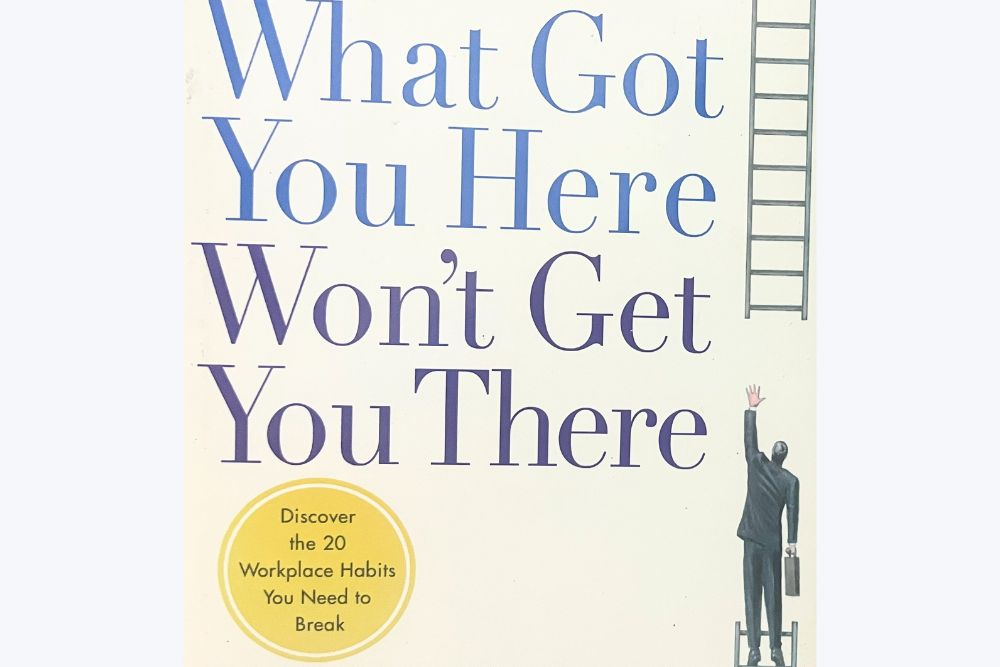A personal review of Marshall Goldsmith’s “What Got You Here Won’t Get You There” book – including what makes it a great addition to your collection!
It’s time for What Got You Here Won’t Get You There review! Back in the day, I received this book as a gift from my manager when I was working full-time at a coaching & training solution provider. After reading it, I found that my life has started turning into another page. I’m far from being perfect – but definitely, if you are aiming to become a better person (whether in the workplace or personal life), I highly recommend that you give the book a try!
Highlights
- The book is based on the argument that successful people need to shed bad habits that may have helped them climb the ladder before, like negativity or stealing credit, in order to reach even greater heights.
- Successful people should do their best to get rid of destructive behavioral patterns that hold them back, rather than just learning new skills.
- Our past success often results in a “delusion” that blinds us to the need to change for the future.
- “What Got You Here Won’t Get You There” is more like a self-reflection tool, rather than one that offers quick technical skill tips.
Book Summary
“What Got You Here Won’t Get You There: How Successful People Become Even More Successful” is a publication by Dr. Marshall Goldsmith, regarded as one of the most impactful executive coaches up to now. The main idea of the book is that the very behaviors that propelled us to success in our early careers may become exactly what hinders us from reaching even greater heights. In other words, the qualities/ habits, etc. that helped you secure the current position/ wealth/ fame (‘what got you here’) may be the very things that need to be let go, so that you may reach greater heights (“to get there’).
Goldsmith’s book highlights the following key points:
- The paradox of success: The behaviors that got you to your current level, like over-competitiveness or assertiveness, might alienate colleagues or superiors, thereby hindering collaboration and growth.
- 20 undesirable habits: Instead of solely acquiring new skills, those aspiring to reach greater heights need to identify and address their negative behavioral tendencies. For this purpose, the book outlines 20 common bad habits, such as making negative assumptions about others or being unwilling to listen.
- Feedback and coaching: Goldsmith emphasizes the importance of receiving regular feedback from trusted colleagues and mentors. Such input, especially those that focus on future possibilities, is crucial for us to become aware of our blind spots and work on changing them.
- Incremental change: Last but not least, the author advocates for a gradual and sustainable approach to behavioral change – by providing a framework for individuals to set specific goals, track their progress, and hold themselves accountable over time.

What Got You Here Won’t Get You There review
As mentioned above, the main focal point of the book is the 20 undesirable habits that people (especially those in higher positions) often fall into, including:
- Winning too much: The desire to win at all costs, under all circumstances.
- Adding too much value: The innate tendency to add our own ideas to every discussion, whether it’s worth doing it or not.
- Passing judgment: The need to rate others and impose our personal standards on them.
- Making destructive comments: The tendency to make sarcastic remarks to make us look “wise”.
- Starting with NO, BUT, HOWEVER: The overuse of negative qualifiers – which just “kills” people’s spirits in every discussion.
- Telling the world how smart we are: The desire to showcase our knowledge/ wisdom/ superiority over others.
- Speaking when angry: The failure to control our emotions – whether in the workplace or in personal life.
- Negativity: The tendency to say things like “Let me explain why that won’t work”, which just lets people down no matter how brilliant their ideas are.
- Withholding information: The refusal to share information to maintain an advantage over others.
- Failing to give proper recognition: The reluctance to give praise and reward people for their good deeds/ efforts.
- Claiming undue credits: The tendency to overestimate our contribution to any success – to the point that we “steal” the credits of those who have played a much more impactful role in the process.
- Making excuses: The need to come up with a “good” reason for our bad behaviors – rather than trying to confront and fix them.
- Clinging to the past: The desire to shift the blame away from ourselves onto something else – whether it’s someone or an incident in the past.
- Playing favorites: The unawareness of the fact that we are treating people unfairly.
- Refusing to express regret: The reluctance to admit our mistakes and take responsibility for our actions.
- Not listening: The most disrespectful way of treating people within interpersonal relationships.
- Failing to express gratitude: The most basic form of bad manners.
- Punishing the messenger: The desire to unleash our emotions onto someone who is just trying to help us.
- Passing the buck: The need to blame anything/ anyone but ourselves.
- An excessive need to be “me”: Exalting our faults as virtues simply because those are part of us – what constitutes our ego.
Additionally, the author also goes over another common behavioral flaw – which occurs when one is too obsessed with achieving certain goals.

What Got You Here Won’t Get You There – Summary & synopsis by chapter
What Got You Here Won’t Get You There Review
Main focus – Behaviors
Now it’s time for the review section. Before we move on, I think it’s worth mentioning the fact that this book is NOT meant for everyone. Especially not for those seeking quick-win tips to upscale their hard, technical skills. Nor for those who are looking for some kind of a “solution” to their problems.
To me, Goldsmith’s book is more about diagnosing, rather than curing.
It doesn’t provide quick fixes – rather, what it does offer is a haven for self-reflection, specifically on our behavioral problems. So that we can slowly pull ourselves together, and become ready for gradual changes that will accumulate into grander transformations over time.
What Got You Here Won’t Get You There discusses things related to mindset rather than technical expertise, tactics, or tips for success. It does not deal with things like strategy, finance, or technology (which I assume are what those who are interested in self-help books often look for).
It’s about personal behaviors – specifically, the destructive ones that we are often unaware of. As stated by the author (which I think makes a lot of sense), it is behavioral issues that distinguish the GOOD from the GREAT (hence the main theme of the book).
Speaking of which, I think it’s safe to say that the book is more relevant to those in management positions, who have to frequently engage in interpersonal issues/ interactions. For people in lower positions/ performing independent roles (e.g. coders)/ working in startup settings (the nature of such businesses requires you to invest resources more on technical/ financial things than interpersonal/ people development issues), you may find yourself alienated reading it. That said, I still think it’s an amazing toolkit to improve your personal life – so if you can spare the time, just go for it!

What Got You Here Won’t Get You There review
To-stop rather than to-do
You read it right. The book’s main message is about STOPPING old routines, not ADOPTING new ones. To demonstrate, I would like to quote a famous saying by Peter Drucker (which is also mentioned in Goldsmith’s book) as follows:
We spend a lot of time teaching leaders what to do. We don’t spend enough time teaching leaders what to stop. Half the leaders I have met don’t need to learn what to do. They need to learn what to stop.
Successful people don’t actually need to learn something new – what they do need is to UNLEARN the old ways. It’s about letting go of routines, behaviors, and even competencies that no longer serve you.
As simple as it is, the process of letting go is not easy. Especially for those who have achieved a certain degree of success in life.
“You said what? Trying to listen to people more? My direct reports are too incompetent to do things on their own. As a leader, I have to step in a lot. Why listen when I can save the time to do more important tasks?”
That is the traditional argument. I have to admit that I too, often fall into this deceiving mindset trap. But again, the book is not about “getting you HERE“. It’s about “getting you THERE“.
We all possess certain traits that others find annoying – be it being overconfident to the point that you push people so hard (which is a variant of “winning too much”), or being too occupied with work that we fail to pay enough attention in conversations (in other words, “not listening”).
We can attribute our misbehaviors to a lot of things (e.g. pushing people because you yourself have done it before) – and that’s perfectly fine if you are OK with being HERE.
If the goal is to get THERE, it’s time to reconsider everything. To self-reflect on our misdeeds up to now (and not just about misdeeds – I think it also applies to knowledge, skills, and ways of working that used to work in the past but no longer now).
If you want to become a better leader, it’s time to shift the focus from getting things done (no matter the costs) – to getting people to get things done. In the right way. In other words, you have to pay more attention to interpersonal – rather than technical issues.
If you want to become a better parent, it’s time to let go of the mindset “I bring the money – that’s enough”, and learn to establish meaningful relationships with your spouse/ children.
The process of unlearning is challenging – and often painful too. You have to confront yourself, your own ego. To become aware of your own success delusion (which makes people stubbornly stick to old routines), admit your blind spots/ imperfections, and restart everything.
But if you manage to remain committed all the way, transformation is what awaits you in the end!
Not only for successful people/ corporate leaders, I think that What Got You Here Won’t Get You There is also a worthy read for those in transition phases of their career path (e.g. people who have decided to switch to a new job/ industry). As you have no previous track record to prove your competencies, your behaviors become even more crucial in terms of determining whether you will advance in the future.

What brought you here won’t get you there
Success delusion
Goldsmith’s book starts with a section that revolves around an issue named “success delusion”. I have to admit that this chapter, initially, was a little bit difficult for me to comprehend.
That said, I believe it’s one of the most well-written parts of the book.
Our previous achievements are what hold many of us back – and make us resistant to change. They turn us into over-confident individuals, who like setting unhealthy standards for others. No wonder why things like burnout, high turnover rates, and low team dynamics become more prevalent than ever in the current workplace.
Most of us have been taught about the importance of seeing opportunities in threats. To practice “positive thinking” – no matter the specific circumstances.
While it’s a good mindset, I think that it is more suitable for solving personal issues – while at the same time much more tricky if applied to a team setting. And over-practicing it will definitely result in countereffects.
Positive thinking – especially if reinforced by compliments about previous achievements – may cause us to become delusional and reluctant to accept change. Especially if the change has to do with your patterns (which many of us think constitute our personal self).

What Got You Here Won’t Get You There review
Other highlights from the book
I find that there are many valuable insights that can be extracted from What Got You Here Won’t Get You There. As it’s impossible to cover all of them in one single article, let’s just go over a few here:
Our behaviors are influenced by self-interests more than we think (or want to admit)
I was extremely struck by the story Goldsmith shared about his retreat in Plum Village in the Habit #7 section (Speaking when angry). Here’s a snapshot of it:
Our guide was the Vietnamese Buddhist monk, Thich Nhat Hanh. Each day Thich Nhat Hanh encouraged us to meditate on a variety of topics.
One day the topic was anger. He asked us to think of a time in our lives when we had become angry and lost control. Then he asked us to analyze who was responsible for our unattractive behavior.
I thought of my daughter Kelly when she was in her teens. She came home wearing a large brightly colored article of jewelry called a navel ring. These are common among the younger set, along with tattoos in hard-to-reach places of the human anatomy. There is no use having a navel ring if people can’t see it! So Kelly had also acquired a heroically skimpy outfit designed to highlight the navel ring (and nearly everything else about her abdomen).
A navel ring on a daughter is one of those moments that truly tests a father’s tolerance and love. But for me it was a little more complicated, I guess. I reacted with something less than enthusiasm. In fact, I devolved into a raving, ranting caricature of an angry father.
As I meditated on this event in the quiet confines of the monastery, I wondered, “What was I thinking about?”
I realized that my first thought was that someone would see my daughter and think, “What a cheap-looking, trashy kid! Who are her parents?”
My second thought was worse. What if one of my friends saw her and thought, “I can’t believe Marshall allows his kid to parade around town like that.”
Who was I concerned about in this case? Kelly or me? Was the bigger problem her navel ring or my ego?
His story speaks to me about the importance of self-reflection and questioning. Of continuous hansei (反省). Without it, we may not be aware of the real patterns/ reasons behind our daily actions.
Without thinking about what you have done, you will never know the root cause of your issues.
Sometimes, it has to do more with WHAT’S IN HERE – rather than WHAT’S OUT THERE. Instead of being self-righteous and shifting the blame onto somebody, maybe it’s time to look inside and realize that the problem has to do with ourselves.
Self-reflection is not meant to devalue yourself. Rather, it’s about admitting our imperfections. That everyone makes mistakes. Even an experienced coach like the author still does (our tendency is to idolize people we respect – without taking into account the fact that they are still human beings, with their own flaws to work on).

What Got You Here Won’t Get You There review
Less me, more them
I remember there was a time when I was so focused on getting things done the right way (or so I think) that I completely neglected my interpersonal side. It drove me to the point that I often self-isolated myself in a room and felt irritated if I had to discuss things with others.
At the same time, my excessive focus on technical issues was a reason why I found it extremely challenging to hand out praises to my direct reports/ colleagues. Many times, I felt that people did not quite meet the necessary standards to deserve a compliment. And I kept silent.
Sometimes, one of my direct reports/ colleagues came to me to present their ideas. As I was too concerned with improving their work, I often made so many modifications – that their work became no longer their own. My behavior just stripped people of their confidence, and made them even more reliant on me (you know what came later – burnout, stress, and irritation, of course).
Also, because I was excessively focused on delivering the best work possible, I often fell into the bad habit of making harsh/sarcastic remarks to others. Instead of saying “thank you” and admitting others’ contributions, I resorted to doing things my own way. A big mistake, as Goldsmith had pointed out in his book: “You are not manging you”.
Now I know better. I have realized the importance of taking care of my interpersonal side, and of stopping to act like a know-it-all nerd (simply, because I know nothing at all).
If you want to become better as a person, try not to become the center of the stage. Learn to let others do things, encourage them, and remain silent if possible. Before doing something, do not ask “Is it true?”. Instead, ask yourself: “Is it worth it?”
It’s really hard, I know. Especially in situations when you know about a better approach, or if you think you have to be the “hero” and stop a colleague from saying something stupid/ careless.
But again, the book is not really about curing. It’s about diagnosing your problems – so that you may start finding a way to work on them. Your very own way.

What Got You Here Won’t Get You There review
When you are learning to change yourself, don’t try to overcomplicate things
What Got You Here Won’t Get You There mentions a few practices that we should adopt to start changing ourselves for the better (e.g. learning to apologize and say thank you). What I find really interesting is Goldsmith’s simplistic (yet effective) approach.
When you apologize, just say sorry. Don’t try to say anything else – otherwise, it’s very easy for us to start making up excuses to cover things up. Just “I’m sorry” – that’s enough. And get out.
When people say something that you are not quite sure how to respond, just say “Thank you”. Nobody will know what’s going on inside you, and you will not have to mess yourself up trying to figure out what to say. Just two words “Thank you” – and that should buy you enough time to pull yourself together & regain control of the situation.
A little pragmatic, I might say. But I think it’s a good approach worth consideration, especially for those who struggle with ego issues.
Over time, as your ego softens (and you notice the effects of your behavior change), you will then become ready for true transformation.

What Got You Here Won’t Get You There review
Do not try to control things that are out of our control
One section in Goldsmith’s book discusses the idea of why we need to “stop trying to coach people who are uncoachable”. In other words, those who think the problem is OUT THERE, not IN HERE.
There are things in life we cannot change. We should not act as a paladin trying to save everyone. At the end of the day, the only person who can save them is themselves (though definitely others do play a role in their transformation).
It does not mean we should stop helping people; rather, it means that we should learn to let go of unrealistic expectations. Instead of being greedy, focus on what we can do (sounds a little bit Stoic, you might think – and I find it’s perfectly OK to think like that).
Maybe it’s not the time when people are ready to change, yet. We have to wait and hope that the day will finally come.

What Got You Here Won’t Get You There review
Read more: Coachability – The Secret to Rapid Growth
Not a completely perfect gem
Despite the various good points above, I think that What Got You Here Won’t Get You There is not without its own limitations. In the book, Goldsmith mentions that he only works with high-performing people, as well as those who would like to change. While that may sound realistic, I’ve also read comments from people who think that this is a pragmatic approach that does not truly solve the problem (again, the book is more about providing a diagnosis, I think).
Elements of pragmatism are found in various sections of the book. For instance, Goldsmith states that he often makes use of punishments like money to keep himself/ others accountable – and he recommends that we do the same thing. While that may be true, I wonder if this advice will result in a skewed view of human behavior – that extrinsic motivators like money, power, fame, etc. play a more important role in defining one’s actions than intrinsic ones (e.g. purpose, honor, self-mastery).
Speaking of which, it reminds me of the Natural Law section in his book. Here’s a snapshot of it:
You can’t force people to work together. You can’t mandate synergy. You can’t manufacture harmony, whether it’s between two people or two divisions. You also can’t order people to change their thinking or behavior. The only law that applies is natural law.
The only natural law I’ve witnessed in three decades of observing successful people’s efforts to become more successful is this: People will do something – including changing their behavior – only if it can be demonstrated that doing so is in their own best interests as defined by their own values.
I’m not being cynical here, or implying that the only motive in life is selfishness. Plenty of people perform selfless acts of goodness of their own volition every day with no obvious tit-for-tat payback to themselves.
What I am saying, though, is that when you take self-volition out of the equation and forces beyond your control are involved, natural law applies. In order for me to get you to do what I want, I have to prove that doing so will benefit you in some way, immediately or somewhere down the road. This is natural law. Every choice, big or small, is a risk-reward decision where your bottom-line thinking is, “What’s in it for me?”
None of us has to apologize for this. It’s the way of the world.
The idea here is simple: without rules, people will just disobey. Without any consequences, people will just stick to their old destructive behaviors.
People say that good deeds have to come from your own heart – but again, I wonder, where does that kindness in your heart come from?
Let’s just leave things here – because I myself have not been able to figure out an answer yet.
However, I do know one thing for sure – if we can come to accept the “ways” of the world as it is, we will no longer place unnecessary burdens on our shoulders.
It’s perfectly OK for us to set high standards for ourselves and do our best to align with them – yet it’s not OK to expect others to act the same way.
It’s perfectly OK to envision the ideal “way” everyone should follow, but whether it will come true is up to other people – to many other things not within our control.
It’s just what it is.
Many times, we have to make compromises – because what works for one may not work for others (e.g. some are motivated by monetary causes – while some may find their drive from delivering meaningful results). And what used to work before may no longer be relevant now (whether it’s applicable in the future is another thing to debate somewhere else). That’s why people have been calling for a situational approach in everything.
In sum, what got you here won’t get you there.

What Got You Here Won’t Get You There review
Favorite Quotes from the Book
There are a lot of memorable quotes from the book, I will only list down a few that I find particularly powerful (at least to me) here:
You are not managing you.
The higher you go, the more your problems are behavioral.
When it’s hysterical, it’s historical.
When somebody makes a suggestion or gives you ideas, you’re either going to learn MORE or learn NOTHING. But you’re not going to learn LESS.
Successful people become great leaders when they learn to shift the focus from themselves to others.

What Got You Here Won’t Get You There quotes
Final Thoughts
And that concludes my review of What Got You Here Won’t Get You There. While I cannot promise that the book will help you achieve your personal goals, I can definitely affirm that after reading it, you will emerge as a better person – both in your personal and professional lives. So, feel free to give it a try – by visiting this Amazon link here.
Also, make sure to visit Goldsmith’s YouTube channel and his latest book “The Earned Life” too. I highly recommend it – especially if you are struggling with finding meaning and fulfillment in life!
Other resources you might be interested in:
- Habits in Personality Development: A Comprehensive Guide to Self-improvement
- The Secret Life of Water (by Masaru Emoto) Book Review
- 20 Best Self-discovery Books: A Journey Within to Find Your North Star
- 15 Best Business Memoirs to Ignite Your Spirit
- 11 Best Coaching Books for Transformation & Success
Let’s Tread the Path Together, Shall We?


